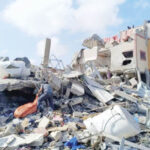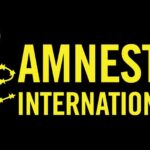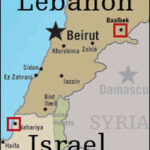Today makes it exactly a year since the war in Gaza started. On the 7th of October, 2023 Hamas militants staged the worst-ever attack on Israel.
On that fateful day, hundreds of Hamas fighters infiltrated Israel. The unprecedented attack resulted in the deaths of 1,205 people, mostly civilians, according to an AFP tally of Israeli official figures.
This toll includes hostages who subsequently died or were killed in captivity in the Gaza Strip.
Hamas took 251 hostages back to Gaza, some as corpses. A year later, some 64 are still detained, while 117 have been freed and 70 confirmed dead.
- How multi-billion naira illicit arms entered Nigeria 23 times in 7 years
- Army destroys illegal refining sites, seizes 115,000 litres of stolen crude
Israeli Prime Minister Benjamin Netanyahu vowed to destroy Hamas, which is blacklisted as a “terrorist” organisation by the European Union and the United States.
Vowing to crush Hamas and bring the hostages home, Israel launched a military campaign in the Gaza Strip from the land, sea and air.
Israel begins bombing Gaza and further tightening its siege of the territory. On October 13, it told civilians in northern Gaza to move south.
The United Nations later estimated that nearly all of Gaza’s population of 2.4 million was eventually displaced.
On October 27, Israel launched a ground offensive.
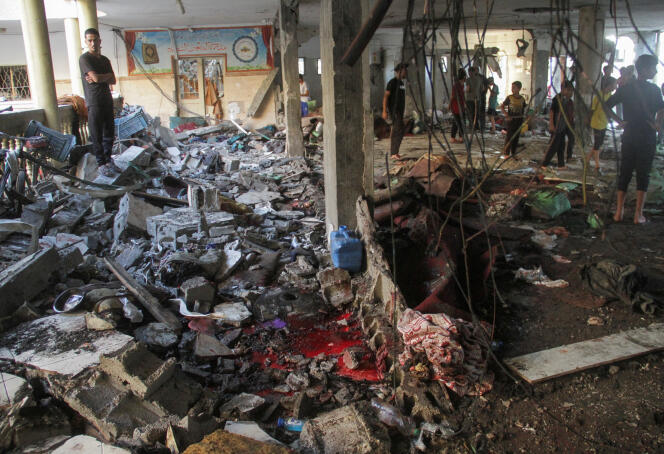
According to data provided on Sunday by the health ministry of Hamas-run Gaza, the war has killed at least 41,870 people, the majority civilians. The United Nations has described these figures as reliable.
The sheer scale of destruction from the deadliest war in Gaza’s history has made the road to recovery difficult to imagine, especially for people who had already lost their homes during previous conflicts.
Hamas has controlled Gaza and run its institutions single-handedly since 2007, after winning a legislative election a year earlier and crushing its Palestinian rivals Fatah in street battles.
Now, most of Gaza’s institutions have either been damaged or destroyed.
Israel accuses Hamas of using schools, health facilities and other civilian infrastructure to conduct operations, a claim Hamas denies.
The war has left no part of Gaza safe from bombardment: schools turned into shelters for the displaced have been hit, as have healthcare facilities.
Hundreds of thousands of children have not gone to school in nearly a year, while universities, power plants, water pumping stations and police stations are no longer operational.
By mid-2024, Gaza’s economy had been reduced to “less than one-sixth of its 2022 level,” according to a UN report that said it would take “decades to bring Gaza back” to its pre-October 7 state.
The collapse has fuelled widespread discontent among Gaza’s 2.4 million people, two-thirds of whom were already poor before the war, according to Mukhaimer Abu Saada, a political researcher at Al-Azhar University in Cairo.
On November 24, a weeklong truce between Israel and Hamas took effect. Hamas releases 80 Israeli hostages in return for 240 Palestinians held in Israeli prisons. Twenty-five other hostages, mainly Thai farm workers, were also freed.
Israel allowed more aid into Gaza via Egypt, but the humanitarian situation there remains dire. When fighting resumed, Israel expanded its actions into southern Gaza.
On May 7, the Israeli army launched a ground offensive in Rafah, Gaza’s southernmost city, where a majority of the territory’s people have sought shelter.
It took control of the border crossing with Egypt, blocking a key entry point for aid, and targeted safe areas including tent camps and schools sheltering displaced people.
Thousands march worldwide
Tens of thousands of protesters marched in cities around the world over the weekend calling for a ceasefire in Gaza and Lebanon as the war in the Palestinian territory entered the one-year mark.
In Washington, more than a thousand protesters demonstrated outside the White House, demanding the United States, Israel’s top military supplier, stop providing weapons and aid to Israel.
Thousands of pro-Palestinian supporters also gathered in cities across Europe, Africa, Australia and the Americas to demand an end to the conflict.
Candlelight vigils are set to take place on the anniversary on Monday of Hamas’s attack on Israel.
With Israel now mounting a ground operation in Lebanon and vowing to respond to a barrage of missiles fired by Iran this week, there are fears the conflict could spiral into a wider war.
Underlining international polarization over events in the Middle East, demonstrations in support of both Israel and the Palestinians are planned worldwide – sometimes with rival events scheduled in the same city.
A pro-Palestinian protest in Rome that drew thousands of people turned violent, as dozens of young demonstrators threw bottles and firecrackers at police, who responded with tear gas and water cannons.
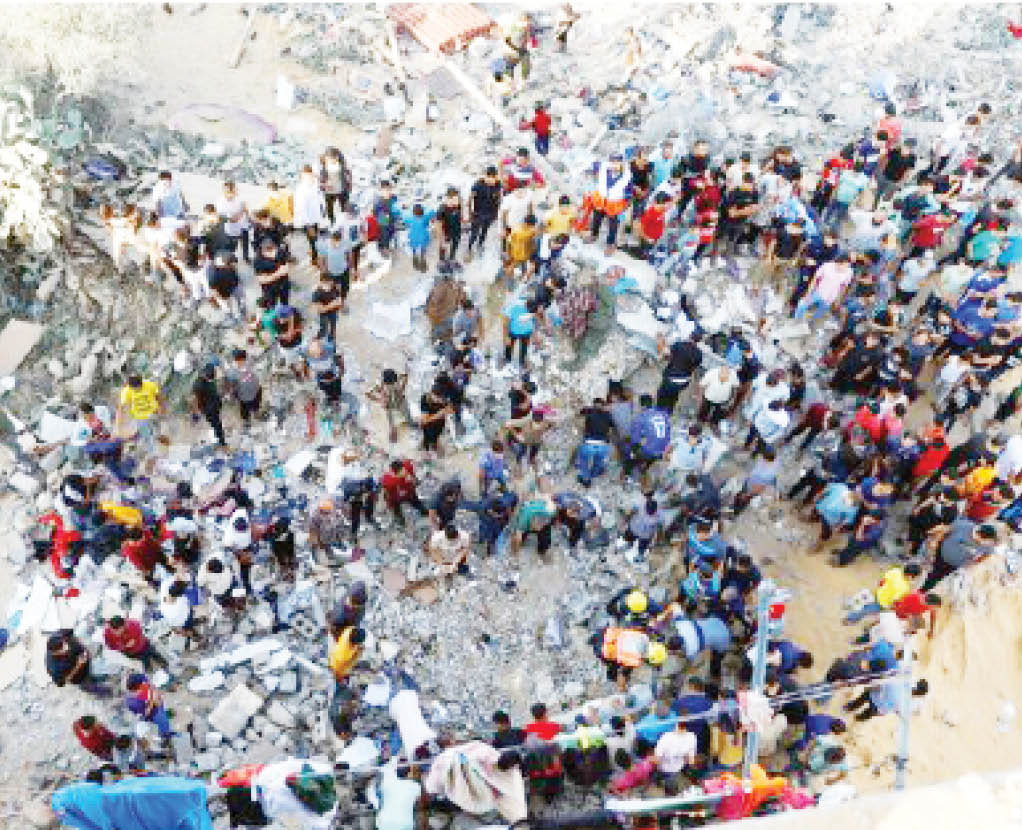
In Berlin, police said they had detained 26 people who shouted insults at a pro-Israeli commemoration attended by around 650 people.
Meanwhile, a pro-Palestinian demonstration drew just over 1,000 protestors in the German capital, police said.
At the “National March for Palestine” in London, chants of “stop bombing civilians” were joined by shouts of “hands off Lebanon”.
In Dublin, several hundred people took to the streets, waving Palestinian flags and chanting: “Ceasefire now!”.
In France, thousands of people marched in Paris, Lyon, Toulouse, Bordeaux and Strasbourg to express solidarity with Palestinians.
Around 5,000 people joined a pro-Palestinian protest in Madrid, brandishing signs with messages such as “Boycott Israel”.
A pro-Palestinian demonstration in the Swiss city of Basel drew several thousand people, the Keystone-ATS news agency reported.
Hundreds of pro-Palestinian demonstrators also marched on the Israeli embassy in Athens.
In Cape Town in South Africa, hundreds walked to parliament, chanting: “Israel is a racist state” and “We are all Palestinian.”
They delivered a petition to the UN calling for an end to the “genocide” of the Palestinians.
In Australia, thousands of pro-Palestinian protestors thronged the streets of Sydney and other major Australian cities, holding placards that read “Stop arming Israel”.
Other pro-Palestinian protests were planned over the weekend and on Monday in cities including New York, Sydney, Buenos Aires, Madrid, Manila, and Karachi.
Commemorations for victims of the October 7 attack are also scheduled internationally, including ceremonies in London, Washington, Paris and Geneva.
An official anniversary ceremony will be held in Jerusalem on Monday.
Israeli President Isaac Herzog will lead a memorial service at Sderot, one of the cities hardest hit during the onslaught by Palestinian militants.
What world leaders said
Iran’s Foreign Minister Abbas Araghchi, visiting Damascus on Saturday after a stop in Beirut, renewed his call for ceasefires in both Gaza and Lebanon, while threatening Israel with an “even stronger” reaction to any attack on Iran.
French President Emmanuel Macron said it was time “that we stop delivering weapons to fight in Gaza,” adding that France was not providing any.
German Chancellor Olaf Scholz again called for a ceasefire Sunday ahead of the first anniversary of the war in Gaza, and warned against rising anti-Semitism in society.
“Unfortunately, on this first anniversary of Hamas’s terror attack on Israel, peace or even reconciliation in the Middle East seem more distant than ever,” Scholz said in a video message.
The German government “continues to persistently advocate for a ceasefire, which must now finally come about”, he added. “So that the civilian population in the Gaza Strip can be better protected and, of course, better cared for. And so that the Israeli hostages can finally be released.
“We are in close contact with our international partners to prevent a further escalation of the conflict,” Scholz said.
On his part, UK Prime Minister Keir Starmer on Sunday called for a ceasefire in Gaza and restraint by all parties, saying the year-long Israel-Hamas conflict had affected community relations in Britain.
“The sparks light touchpapers in our own communities here at home,” Starmer wrote in the Sunday Times ahead of the anniversary of the war.
“Israel and the Middle East are not just inseparable from our nation’s history. They have a deep relationship with our multicultural society,” Starmer said, pointing out that “millions have family ties to the region”.
While Starmer said the UK would “stand with Israel in the face of Iranian aggression”, he also cautioned that “a better future will not be won by traumatising, orphaning and displacing another generation”.
“The anniversary of the October 7 attacks should remind us of the cost of political failure,” he added. “No security will be found in greater destabilisation.”
UK faith leaders also said on Sunday the anniversary should be an occasion for the public to reject “prejudice and hatred in all its forms”.
The Archbishop of Canterbury Justin Welby, Chief Rabbi Ephraim Mirvis and the chairman of the Mosques and Imams National Advisory Board Imam Qari Asim wrote an open letter to say they “stand united in our grief”.
“In these challenging times, we must also reject those who seek to divide us,” the joint letter said.
“Anti-Jewish hate and anti-Muslim hate have no place in the UK today.”
Israel on alert
Meanwhile, Israel has placed its forces on alert Saturday ahead of the anniversary, after a military official said the country was preparing its retaliation for Iran’s missile attack.
The alert came as Israel engaged in an intensifying war with the Lebanese group Hezbollah, which military chief Lieutenant General Herzi Halevi said would be hit “without concession or respite”.
Ahead of today’s anniversary, military spokesman Rear Admiral Daniel Hagari said at a televised briefing: “We are prepared with increased forces in anticipation for this day” when there could be “attacks on the home front”.
The Israeli military said Sunday its forces surrounded the Jabaliya area of northern Gaza in response to indications Hamas was rebuilding despite nearly a year of strikes and fighting.
“The troops of the 401st Brigade and the 460th Brigade have successfully encircled the area and are currently continuing to operate in the area,” the military said in a statement.
It cited intelligence suggesting the “presence of terrorists and terror infrastructure in the area of Jabaliya… as well as efforts by Hamas to rebuild its operational capabilities in the area”.
“Prior to and during the operation, the IAF (air force) struck dozens of military targets in the area to assist IDF (army) ground troops,” the military said, adding targets hit were weapons storage facilities, underground infrastructure sites and other militant infrastructure sites.
![palestinians hold eid al adha prayers by the ruins of ar rahma mosque destroyed by israeli air strikes, in khan younis, in the southern gaza strip. [mohammed salem reuters]](https://dailytrust.com/wp-content/uploads/2024/06/palestinians-hold-eid-al-adha-prayers-by-the-ruins-of-ar-rahma-mosque-destroyed-by-israeli-air-strikes-in-khan-younis-in-the-southern-gaza-strip.-mohammed-salem-reuters.jpg)
 Join Daily Trust WhatsApp Community For Quick Access To News and Happenings Around You.
Join Daily Trust WhatsApp Community For Quick Access To News and Happenings Around You.